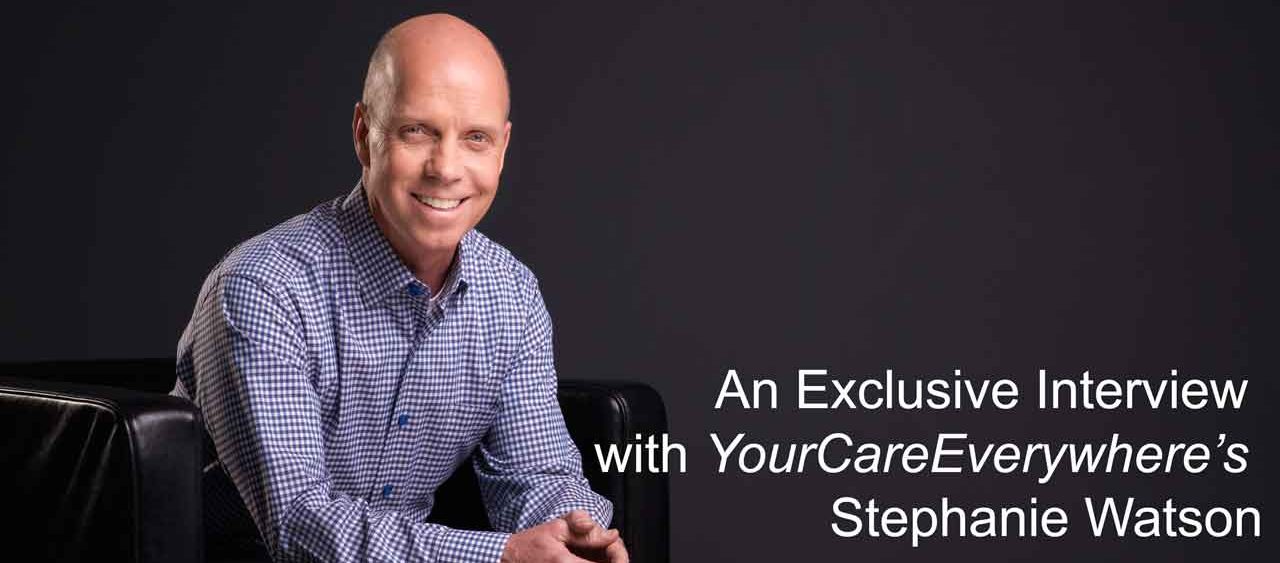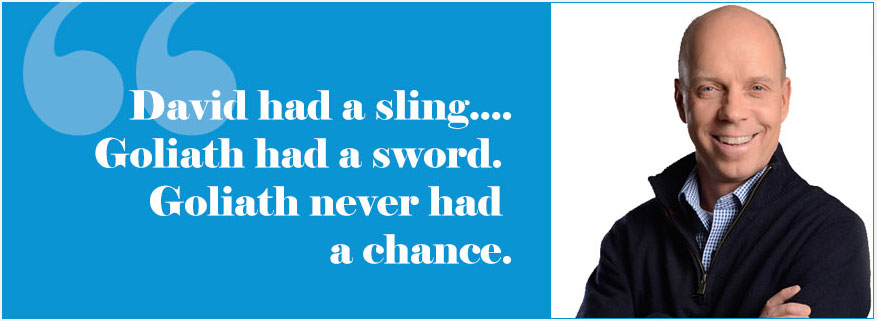Scott Hamilton Beats the Odds and Keeps Winning

YourCareEverywhere had the fortunate opportunity to sit down recently with four-time Olympic Gold medal winner Scott Hamilton, for what became a two-hour exclusive discussion of his life, family, and journey through cancer and brain tumors. Join us as we share with you new insights into Scott’s childhood, his accidental introduction to ice skating, his diagnosis of testicular cancer and three subsequent benign brain tumors, and much more, including how he finds hope and an unfaltering focus on eliminating cancer for all through his Scott Hamilton CARES Foundation.
Scott Hamilton is telling a story about David and Goliath. This isn’t the typical “little guy surmounts the odds and defeats the giant” story. It’s the “giant never had a chance against diminutive tough guy” version of the tale. “It’s like this great big, 100-foot guy coming at you with a sword, and you’ve got a sniper rifle,” he says. Hamilton is that version of David.
When a childhood illness stunted his growth, he discovered he was the perfect height for figure skating. When his mother died of breast cancer, he channeled his sorrow — and her aspirations  — into Olympic gold. When he was diagnosed with testicular cancer, followed by not one but three brain tumors, he used his illnesses as a springboard to found a crusading cancer foundation.
— into Olympic gold. When he was diagnosed with testicular cancer, followed by not one but three brain tumors, he used his illnesses as a springboard to found a crusading cancer foundation.
No matter how big and mighty his foes have seemed over the years, this seeming underdog has managed to conquer them. “I’ve done this. I’ve been through this. I’m still here,” he says.
YOU MIGHT ALSO LIKE: Our section about common people doing uncommon acts, #IGiveBeyond
Finding his legs
As a child growing up in Bowling Green, Ohio, Hamilton was not only the smallest of his peers but also the sickliest. A strange, undiagnosed illness prevented his body from properly absorbing nutrients from food. His parents — who had adopted him shortly after birth — took him from hospital to hospital, where doctors put him through a battery of tests. Yet even leading pediatric specialists couldn’t put a name to his mysterious condition.
“It was at times a chamber of horrors,” he says of those early years. “But at other times it was empowering because I learned how to be independent. I learned how to be self-sufficient at a very young age.”
Hamilton soon developed the ability to turn any situation to his advantage. When his parents got burned out from years of doctors’ visits and medical dead-ends, the family doctor recommended they take a day off. They dropped Hamilton off one morning at the Bowling Green State University ice skating rink. The rest, as they say, is history.
At first, Hamilton had to cling to the wall to stay upright on his skates, but he quickly took to the sport. “Soon I was going all the way around the rink. And soon I was going all the way around the rink as well as the well kids. And soon I was going all the way around the rink as well as the best athletes in my grade,” he says.
Skating turned out to be just the thing for Hamilton’s condition. The more he skated, the stronger and healthier he grew. “Everything started working better, and all of a sudden I started growing, and it was kind of miraculous,” he says. “It really makes no medical or scientific sense, but skating changed everything.”
From first steps to Olympic gold
It wasn’t long before Hamilton was a good enough skater to compete in national championships. Sixteen years after he took those first tentative steps onto the ice, he achieved the pinnacle of success in figure skating — a gold medal at the 1984 Olympic games in Sarajevo.
His one regret was that his mother, Dorothy, wasn’t there to see him win. She’d died of breast cancer when he was 18 years old, leaving him grappling with guilt and loss. “She was the center of my universe. She sacrificed everything for me,” he says. “She always thought, ‘You’re going to the Olympics.’” After her death, “I was accountable to her. I wouldn’t be late. I’d show up and work hard every session.”
Hamilton would go on to win 16 consecutive national and world championships. By his early 30s, he’d become a legend in his sport, inducted into both the U.S. Olympics and World Figure Skating Halls of Fame.
YOU MIGHT ALSO LIKE: She Gave the Love of Her Life a Kidney

A new chapter
In 1984, after winning Olympic gold, Hamilton turned professional. He joined the cast of Ice Capades, only to be released from his contract two years later when the company changed ownership. Undeterred, Hamilton went on the road with his own show, Stars on Ice.
Over the years, Stars on Ice has featured some of the top names in skating — including Dorothy Hamill, Robin Cousins, Kristi Yamaguchi, and Brian Orser — and it continues to be known as the country’s premier professional skating tour. “I worked really hard, and there wasn’t anything I wouldn’t do to make it happen,” he says. “Stars on Ice just started taking on steam.”
Difficult diagnosis
Hamilton’s career was on fire. In March 1997, he was in the middle of a 60-city tour with Stars on Ice. Then, during a stop in Peoria, Ill., it became obvious that something was very wrong with him. “It was hard to stand up straight all the way because I had this abdominal pain… I knew that it didn’t make sense.”
He went to an emergency room, where a doctor sat him down to tell him the news. “He said, ‘We found a mass.’” It was testicular cancer — stage 3. “In that moment, almost 20 years to the day that I lost my mom, I realized I’m being diagnosed with cancer,” he says. “It was really frightening. All I saw was her. I saw her diminished, and I saw her in pain. I saw the surgeries, and I saw so much of the suffering she went through.”
Through his fear and anxiety, Hamilton found a new resolve. “All of a sudden I felt something flip, and it was like, ‘I’ve got to get to work…. I’ve got to fight this thing,’” he recalls. “I went from this cowering person just smothered in fear to breaking out of it and going, ‘Let’s get to work. Whatever it is, I’m going to beat it back because I’ve got a tour to do in about six months, and I’ve got to be there.’”
Surgery at the Cleveland Clinic took care of the tumor. By late October, Hamilton was back on the ice — even performing his signature backflip. “It hurt like crazy, but it went up — it floated. That was fun. And it was a very powerful statement.”
Rounds two, three, and four
Hamilton survived testicular cancer, but just a few years later, in 2004, he was hit with more devastating news. His doctors had discovered a brain tumor. “I thought at 108 years old I was going to get hit by a truck, and that was how I’d leave the planet. But now I’ve got this brain tumor that I’ve got to deal with, and it was really scary,” he says.
During his testicular cancer diagnosis and treatment, Hamilton had been single. With the brain tumor, things were different. He was married to wife Tracie, and the couple had a 14-month-old son. With the same determination that had helped him win Olympic gold and conquer testicular cancer — along with surgery and radiation therapy — Hamilton beat his brain tumor. He then conquered a second brain tumor in 2010. By the time he was diagnosed with his third brain tumor, in 2016 at age 58, he was the father of four. He and Tracie had two children of their own — Aidan and Maxx — and they’d adopted two children — Jean Paul and Evelyne — from Haiti.
“When [the doctor] told me it was back, all I heard was ‘Get strong,’” he says. “And so I started hitting the gym, buying all these free weights…. I just started getting obsessed with getting healthy.”
This March, scans showed the tumor had shrunk without treatment. Hamilton’s doctor told him the type of tumor he has, a craniopharyngioma, often grows, but it never shrinks. “I feel like I’m the recipient of this really beautiful miracle,” he says.
Scott Hamilton CARES
Hamilton was able to beat the odds not once, but four times. In 1999, he decided to give something back to the Cleveland Clinic — the hospital that saved his life. He started  Scott Hamilton Cancer Alliance for Research (CARES) within the hospital’s
Scott Hamilton Cancer Alliance for Research (CARES) within the hospital’s  Taussig Cancer Institute. Today, the Scott Hamilton CARES Foundation funds groundbreaking cancer research and provides patients with the guidance and support they need to survive — and thrive.
Taussig Cancer Institute. Today, the Scott Hamilton CARES Foundation funds groundbreaking cancer research and provides patients with the guidance and support they need to survive — and thrive.
“We know that there’s one thing that every cancer patient has in common. They just want more and better options. They want to truly understand what they’re going through. And they also need the support to help them go through it,” he says. To provide that support, the Foundation launched its 4th Angel mentoring program, which pairs newly diagnosed patients with survivors. “[The survivors] work as life coaches, role models, and it’s kind of exciting to see these relationships being formed,” he says.
Through all his successes, both on and off the ice, Hamilton considers himself an unlikely hero. “I’m five foot nothing, bald. There’s all these things about me that don’t really fit into what most people would think is ideal,” he says. “It’s so unlikely that this would happen to me…. I’m nothing special. I just figured out a way to deal with stuff, and everyone can.”
WANT TO FOLLOW SCOTT'S JOURNEY? Continue with Scott Hamilton's Miracle
Updated:
May 01, 2017
Reviewed By:
Christopher Nystuen, MD, MBA